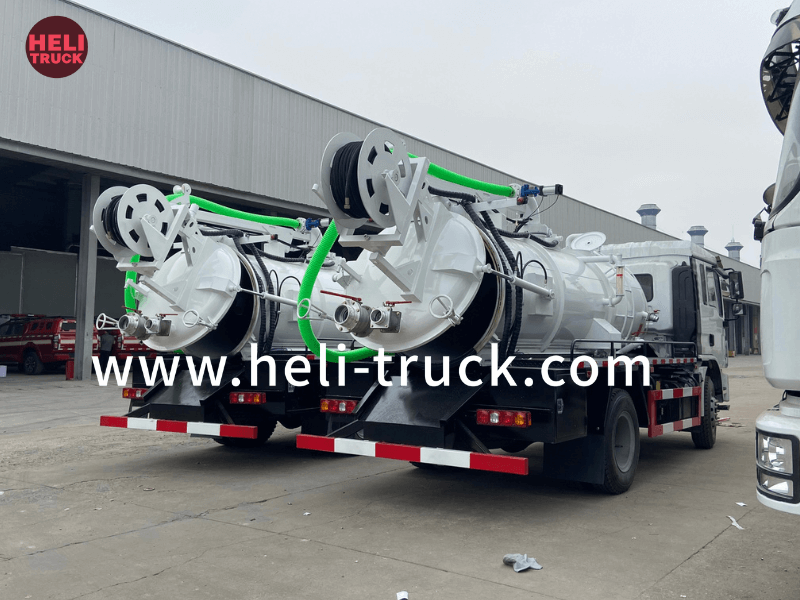Introduction

Garbage compactor trucks play a vital role in waste management systems by collecting, compacting, and transporting solid waste efficiently. These specialized vehicles come in various types and configurations to meet the diverse needs of municipalities, commercial entities, and waste management companies. In this article, we will explore the different types of garbage compactor trucks, their features, benefits, and applications.
1. Rear Loader Compactor Trucks
Rear loader compactor trucks are one of the most common types of garbage trucks used for residential waste collection. These trucks feature a hydraulic compactor that compresses the collected waste to maximize the load capacity. The rear loader design allows waste collection crews to load trash from curbside bins or containers into the compactor at the rear of the vehicle.
2. Front Loader Compactor Trucks
Front loader compactor trucks are commonly used for commercial and industrial waste collection. These trucks are equipped with a front-loading mechanism that allows them to empty large dumpsters or containers directly into the compactor. Front loader trucks are ideal for high-volume waste collection routes and can handle bulky items more efficiently than rear loader trucks.
3. Side Loader Compactor Trucks
Side loader compactor trucks feature a loading mechanism on the side of the vehicle, allowing waste collection crews to pick up trash from bins or containers along the route. These trucks are commonly used in residential areas with narrow streets or limited access for larger vehicles. Side loader compactor trucks are versatile and can handle both residential and commercial waste collection tasks.
4. Transfer Station Compactor Trucks
Transfer station compactor trucks are designed to transport compacted waste from collection points to disposal facilities such as landfills or recycling centers. These trucks are equipped with powerful compaction systems to maximize the payload capacity and reduce the number of trips required for waste disposal. Transfer station compactor trucks play a crucial role in streamlining the waste management process and reducing transportation costs.
5. Roll-Off Compactor Trucks
Roll-off compactor trucks are used for collecting and transporting large volumes of waste generated by construction sites, demolition projects, or industrial facilities. These trucks feature a roll-off container that can be easily loaded and unloaded using a hydraulic lifting system. Roll-off compactor trucks are highly versatile and can handle a wide range of waste materials, including construction debris, bulky items, and recyclables.
6. Automated Side Loader Compactor Trucks
Automated side loader compactor trucks are equipped with robotic arms or grabbers that can lift and empty residential waste bins automatically. These trucks are commonly used in areas with automated waste collection systems to improve efficiency and reduce manual labor. Automated side loader compactor trucks are equipped with advanced technology to optimize waste collection routes and minimize environmental impact.
7. Mini Compactor Trucks
Mini compactor trucks, also known as compact garbage trucks or mini compactors, are small-sized vehicles designed for collecting waste in narrow streets, alleys, or densely populated areas. These compact trucks feature a built-in compactor that can compress the waste on-site, reducing the volume and minimizing the number of trips required for waste collection. garbage truck manufacturers are ideal for urban areas with limited space and access constraints.
8. Hybrid Compactor Trucks
Hybrid compactor trucks combine traditional diesel engines with electric motors or alternative fuel systems to reduce emissions and fuel consumption. These environmentally friendly vehicles are increasingly being adopted by municipalities and waste management companies to meet sustainability goals and reduce carbon footprint. Hybrid compactor trucks offer improved fuel efficiency, lower operating costs, and reduced environmental impact compared to conventional diesel-powered trucks.
Conclusion
Garbage compactor trucks come in various types and configurations to meet the diverse needs of waste management operations. Whether collecting residential waste, commercial trash, or industrial debris, there is a compactor truck type suited for every application. By understanding the different types of garbage compactor trucks and their features, benefits, and applications, waste management professionals can choose the right vehicle to optimize their waste collection and disposal processes. Investing in the right compactor truck type can improve operational efficiency, reduce costs, and contribute to a cleaner and more sustainable environment.
